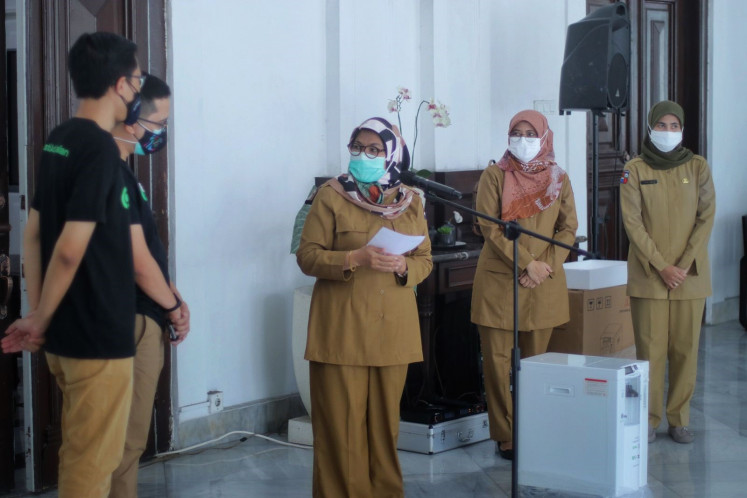
Sri Nowo Retno, head of the Bogor Health Agency, receives oxygen concentrators on Aug. 30.
After an arduous period that saw daily COVID-19 cases in the 50,000s in July, Indonesia has seemingly reined in the pandemic. With a peak of 574,135 active cases on July 24, an increased focus on healthcare support and vaccinations has greatly suppressed the spread of the virus, with the number of active cases falling to 168,317 on Sept. 3.
Despite the optimistic outlook, a number of hospitals and healthcare facilities, especially at a regional level, are still grappling with the availability of oxygen tanks, which are sorely needed to treat their patients.
As part of its collaborative approach to COVID-19 handling, based on the national spirit of gotong royong (mutual cooperation), Indonesia’s largest technology group GoTo has donated over 1,000 oxygen concentrators to healthcare facilities across the country, which included 200 units distributed to the Health Ministry on Aug. 9.
Following the Aug. 9 shipment, GoTo continued distributing hundreds more oxygen concentrators to 46 cities, regencies and provinces, including West Java, Yogyakarta, East Java, Bali and East Kalimantan. Even today the distribution process continues.
West Java Governor Ridwan Kamil highlighted the urgency of the donations, saying that there had been life-or-death situations during COVID-19 treatment.
“Reflecting on our experience in managing the oxygen supply in West Java, this time around we are more prepared, and I would like to thank these kind people,” he said.
IBG Fajar Manuaba, chairman of the Private Hospitals Association’s Balinese chapter, expressed his gratitude for the oxygen concentrators, which were received by Bali Governor Wayan Koster.
“This medical equipment is of course very useful for us for treating patients in need of oxygen. This spirit of gotong royong is very much appreciated and enables us to support the government during the pandemic,” Fajar said.
In a statement, Health Minister Budi Gunadi Sadikin expressed his appreciation and gratitude for GoTo’s donation, saying that the support would hugely benefit Indonesian hospitals and healthcare facilities.
“I acknowledge that the government cannot work alone, and requires the combined efforts of the public and stakeholders. I greatly appreciate GoTo’s collaborative support, which will strengthen our efforts in containing COVID-19,” Budi said.
GoTo, which owns Gojek, Tokopedia and GoTo Financial, collaborated with Sequoia Capital and a number of start-ups under the venture capital firm. The group facilitated the donations through the nonprofit organization Yayasan Anak Bangsa Bisa (YABB), which was established by Gojek to build prosperity through technological innovations.
GoTo CEO Andre Soelistyo said that the COVID-19 response required the spirit of gotong royong, which had always been a part of Indonesia’s national identity.
“By working with a number of start-ups under Sequoia Capital India, we hope that our support can provide relief to the government’s efforts in containing the COVID-19 pandemic. This donation is part of our sustained efforts for COVID-19 readiness since the start of the pandemic, through a systematic approach supporting the government, healthcare workers, partners and employees,” Andre said.
The donation is part of GoTo’s #BangkitBersama (#RiseTogether) movement, which aims to support the national COVID-19 pandemic response through the GoTo ecosystem, along with supporting the public, including micro, small and medium enterprises (MSMEs) and informal sector workers, to accelerate the recovery of the local economy.
GoTo’s support for the national COVID-19 handling is focused on three main pillars: